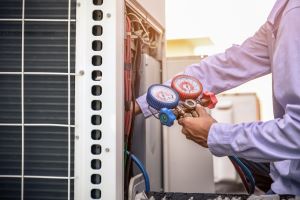Customizable System Upgrades with DMAKS HVAC Tailored Solutions.
Customizable System Upgrades with DMAKS HVAC Tailored Solutions.
Blog Article
Energy-Efficient Heating And Cooling Systems to Save Money On Utility Expenses
As power prices remain to rise, the relevance of energy-efficient a/c systems comes to be increasingly noticeable. These systems not just guarantee significant cost savings on utility bills however additionally add to a much more sustainable future by reducing power usage. With numerous choices readily available, consisting of geothermal warm pumps and ductless mini-splits, property proprietors deal with a plethora of options that can enhance convenience and air top quality. Nonetheless, comprehending the vital functions and maintenance requirements is vital to maximizing these advantages. What variables should be prioritized when picking the best system for your requirements?
Advantages of Energy-Efficient HVAC Systems
Energy-efficient HVAC systems offer various benefits that expand past mere expense savings. By eating less power, these systems add to decrease greenhouse gas emissions, helping to deal with environment modification and promote sustainability.
Furthermore, energy-efficient HVAC systems typically offer enhanced comfort degrees. Most of these systems feature sophisticated technology that enables far better temperature level control and boosted air high quality (DMAKS HVAC). This results in a much healthier interior setting, which is especially essential for people with allergies or respiratory issues
Additionally, purchasing energy-efficient a/c systems can enhance home value. As even more customers focus on power efficiency, homes and buildings equipped with these systems might draw in higher proposals in the actual estate market.
Sorts Of Energy-Efficient A/c Options
Just how can house owners and businesses choose the most suitable energy-efficient HVAC options for their demands? The market offers a variety of energy-efficient a/c systems, each designed to enhance comfort while lessening power consumption.
One option is the variable refrigerant circulation (VRF) system, which efficiently manages the temperature level in several zones within a building. This system adjusts its cooling agent circulation to match the desired temperature, bring about significant energy savings.
An additional prominent selection is geothermal heatpump, which use the planet's secure temperature to warmth and trendy spaces. By moving warmth to and from the ground, these systems demonstrate excellent effectiveness, specifically in modest environments.
In addition, ductless mini-split systems supply an energy-efficient alternative for homes doing not have ductwork. These systems enable zone-specific heating and cooling, lowering energy waste in empty locations.
Lastly, high-efficiency heating systems and air conditioning unit, with advanced SEER and AFUE scores, use dependable climate control while consuming less energy than conventional designs. By evaluating these options, property owners and services can select an a/c system tailored to their details requirements and energy efficiency objectives.
Trick Features to Think About

Next, investigate the type of compressor utilized in the system. DMAKS HVAC. Variable-speed compressors can change their outcome to match the heating or cooling need, bring about improved convenience and power financial savings compared to single-speed models. Furthermore, try to find systems equipped with wise thermostats that offer programmable setups and remote accessibility, permitting better control over energy intake
One more crucial attribute is the system's air purification capacity. High-efficiency filters can boost interior air top quality and minimize power intake by making certain the system runs successfully. Moreover, take into consideration the kind of refrigerant utilized; modern systems frequently use environmentally friendly refrigerants that have a reduced ecological effect.
Last but not least, make sure that the system works with zoning innovation, which allows for tailored temperature control in various areas of your home, enhancing convenience while reducing energy use.
Tips for Selecting the Right System


Next, think about energy efficiency scores, specifically the Seasonal Power Performance Proportion (SEER) for cooling systems and the Yearly Gas Use Effectiveness (AFUE) for heater. Higher rankings suggest greater efficiency, which can result in significant financial savings on utility bills with time.
Furthermore, evaluate the kind of heating and cooling system that ideal matches your way of living and budget. Options include central air, ductless mini-splits, and more tips here heatpump, each with its own set of benefits and drawbacks.
Do not neglect the importance of appropriate installation and sizing; an inaccurately sized system can cause ineffectiveness and raised wear. Seek advice from with a professional A/c professional to acquire expert recommendations customized to your home's unique demands. This thorough method will make certain that you select an energy-efficient a/c system that fulfills your needs and budget plan efficiently.
Upkeep for Optimal Effectiveness
When the appropriate heating and cooling system remains in location, continuous upkeep comes to be key to guaranteeing optimum effectiveness and long life. A properly maintained system operates better, resulting in reduced energy usage and minimized energy costs. Regular evaluations and tune-ups ought to be arranged a minimum of two times a year-- once prior to the cooling season and when before the heating period.

Property owners should additionally be alert about monitoring their HVAC system's efficiency. Uncommon sounds, changing temperature levels, or enhanced power bills can show underlying problems that call for immediate interest. By resolving these problems promptly, house owners can prevent expensive repair services and extend the life expectancy of their systems.
Buying a maintenance strategy with a qualified service technician not just enhances effectiveness however additionally provides peace of mind, understanding that the system is running at its ideal. DMAKS HVAC. Regular maintenance is as a result essential for sustaining energy efficiency and minimizing total functional costs
Conclusion
In final thought, energy-efficient cooling and heating systems offer a viable service for minimizing you could try here energy costs while improving comfort and air high quality. By integrating innovative modern technologies and alternatives such as geothermal warm pumps and ductless mini-splits, property owners can achieve significant energy savings and contribute to ecological sustainability. Cautious consideration of system functions and continuous upkeep further guarantees optimal performance, making energy-efficient systems a sensible financial investment for both financial and environmental advantages.
Report this page